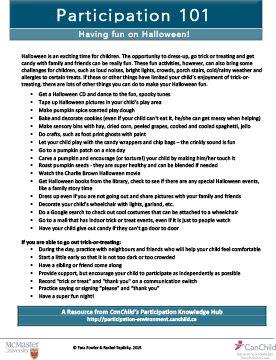Welcome to the October edition of CanChild Today! In this issue, we are proud to feature new videos and resources resulting from recent collaborations with researchers, families and organizations around the world. We also invite you to join us in celebrating good news and recent publications from the CanChild community!
Please feel free to share CanChild resources and this newsletter with family, friends and colleagues. They can subscribe to the CanChild Today e-Newsletter for free by registering
here
. Our past issues are archived on the CanChild website and can be accessed
here!
|
|
Featured Resource!
 Participation 101: Having Fun on Halloween!
Participation 101: Having Fun on Halloween!
|
|
New Video!
DMCN Author Podcast: Peter Rosenbaum and Briano Di Rezze
The Autism Classification System of Functioning: Social Communication (ACSF:SC), provides a standardized and simplified way for clinicians, therapists, teachers, and parents to talk about what a child's social communication abilities are - what they CAN do rather than what they cannot.
|
News & Announcements!
|
"Cerebral Palsy: The Six 'F-Words' for CP" poster

|
CanChild Scientists Featured in New Video Series
Each video has had thousands of views on Facebook. Please share with family, friends and colleagues to help raise awareness of CP and CanChild research!

|
Jan Willem Gorter discusses teens in transition. What do you do to encourage your child's independence?
|

|
Darcy Fehlings explains how CP can affect the brain depending on the type and location of the brain injury.
|

|
Peter Rosenbaum presents an overview of CP, including what we can do to help individuals with CP and their families.
|

|
Biggest Misconception: CP is all the same
Darcy Fehlings addresses one of the biggest CP myths of all.
|
|
|
Jan Willem Gorter sums up the groundbreaking "F-words" paper in 30 seconds!
|
Congratulations to Debra Stewart!
Debra Stewart
was presented with the Honourary Life Membership Award from the
Ontario Society of Occupational Therapists
(OSOT) on September 23rd, 2016. The award recognizes individuals who have made outstanding contributions to the field of occupational therapy in Ontario, and was presented at the OSOT Conference. Read more about the award and Debra's distinguished career
here
.
Key Articles for Occupational Therapy Month
|
 |
|
Recent Publications by CanChild Members
Families of children with autism spectrum disorder (ASD) often utilize a variety of professional services. Accessing these services can provide potential benefits, but the process of accessing, navigating and participating in these services can also place additional demands on the family, particularly on the mother. This study evaluates the relationship between interactions with service systems and maternal psychological wellbeing. This study is novel in that the majority of existing research concerning the psychological wellbeing of parents of a child with ASD focuses on family or child factors, rather than interactions with service systems. Understanding how the access of professional services impacts maternal psychological wellbeing is crucial to improving services and systems of care.
Authors: Hodgetts S, McConnell D, Zwaigenbaum L, Nicholas D. Child Care Health Dev. 2016 Sep 12. doi: 10.1111/cch.12398. [Epub ahead of print]
The family environment is of unquestionable importance in the development of children with neurodisabilities, and research on the family has grown considerably over the past 30 years. The purpose of this study is to outline the scope of measures of family environment used in this research, describe frequently used measures in terms of their theoretical and practical characteristics,
and explore
how measures of family environment has and can be used in research. Challenges, opportunities and recommendations on how to improve the use of family environment measures are discussed.
|
 |
Canadian Anti-Spam Legislation
You are a member of the CanChild Today electronic newsletter generated by CanChild at McMaster University. If you believe that you should not be a recipient, you may withdraw your consent to receive these messages at any time, in accordance with Canadian Anti-Spam Legislation (CASL) and subject to McMaster University policy, by contacting the sender of this message, or by clicking on the 'SafeUnsubscribe' link at the bottom of this newsletter.
|
|
|
|
|